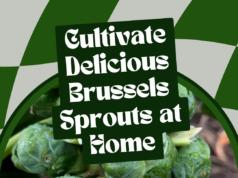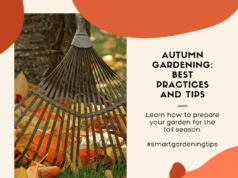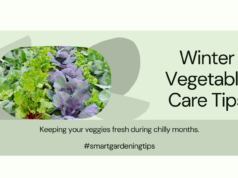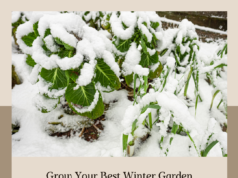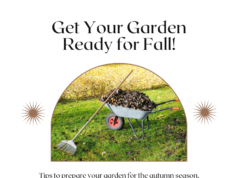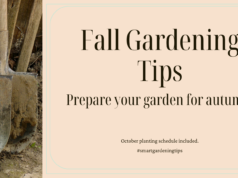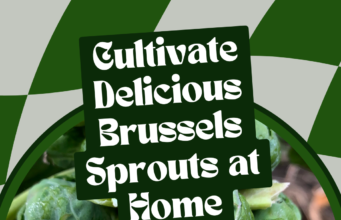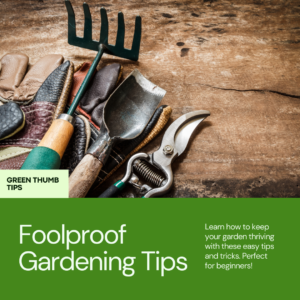
Are you a beginner looking to start your own garden, but not sure where to begin? Look no further! In this article, we will share foolproof gardening tips to help you kickstart your green thumb journey. Whether you have a spacious backyard or a small balcony, these tips will guide you through the basics of gardening and ensure your success as a beginner.
Key Takeaways:
- Starting a garden as a beginner can be a rewarding and enjoyable hobby.
- Choosing the right location with ample sunlight is crucial for your plants’ growth.
- Invest in essential gardening tools to make your gardening journey easier.
- Select beginner-friendly plants that thrive in your climate and soil conditions.
- Learn basic gardening techniques such as preparing soil, proper watering, fertilizing, and mulching.
Choosing the Right Location For Your Foolproof Gardening Tips
When it comes to starting your own garden, one of the first and most crucial decisions you’ll need to make is choosing the right location. The success and growth of your plants depend greatly on the factors surrounding their environment. By evaluating your available space and sunlight, you can ensure optimal plant growth and a thriving garden.
Assessing your available space is essential before planting. Consider the size and layout of your garden area. Whether you have a spacious backyard or a small balcony, make the most of the available space by planning your garden layout effectively. Keep in mind that certain plants require more room to grow, while others thrive in confined spaces.
Sunlight plays a vital role in plant growth and development. Before planting, observe the sunlight patterns in your chosen location throughout the day. Most plants require ample sunlight to flourish, so choose a spot where they can receive at least six hours of direct sunlight daily. If you have limited direct sunlight, opt for shade-loving plants that can thrive in partial or dappled sunlight.
Now that you understand the importance of available space and sunlight, here are some Top Tips For Improving The Conditions of Your Garden Soiltips for selecting the best spot for your garden:
- Observe the different areas of your outdoor space throughout the day to determine the sunniest spots.
- Consider the proximity of your garden to a water source to make watering easier.
- Take note of any obstacles such as trees or buildings that may cast shade on your garden.
- Ensure that the location is easily accessible for maintenance and harvesting.
Remember, choosing the right location sets the foundation for a successful garden. So take your time and carefully assess your available space and sunlight to create an ideal environment for your plants to thrive.
Testimonials from Expert Gardeners
“Finding the right location for your garden is crucial. I always recommend evaluating the available space and sunlight to ensure healthy plant growth. It’s the first step towards a green thumb journey!” – Jane Smith, Master Gardener
“I’ve seen many novice gardeners struggle because they neglected to choose the right location for their garden. Take the time to assess your space and sunlight, and you’ll set yourself up for gardening success.” – David Johnson, Horticulturist
Essential Gardening Tools For Your Foolproof Gardening Tips
As a beginner gardener, having the right tools is crucial for your gardening success. The essential gardening tools listed below will help you cultivate a thriving garden and make your gardening journey more enjoyable.
| Tool | Function | Image |
|---|---|---|
| Trowel | A hand tool used for digging small holes, transplanting seedlings, and removing weeds. | |
| Pruners | Used for cutting back plants, pruning branches, and shaping shrubs. They are essential for maintaining the health and appearance of your garden. | |
| Garden Fork | Helps loosen and aerate compacted soil, making it easier for plants to grow their roots and access nutrients. | |
| Garden Gloves | Protect your hands from thorns, prickly plants, and sharp objects in the garden. |
It’s important to acquire high-quality tools that are durable and comfortable to use. Look for tools with ergonomic designs and sturdy materials that will withstand frequent use.
Tips for Acquiring and Maintaining Your Tools:
- Invest in long-lasting tools from reputable brands. They may cost more upfront, but they will save you money in the long run.
- Keep your tools clean and dry after each use to prevent rust and damage.
- Sharpen pruners and shears regularly to ensure clean cuts and prevent damage to plants.
- Store your tools in a dry, well-ventilated area to protect them from moisture and prolong their lifespan.
Having the essential gardening tools not only makes your gardening tasks easier but also ensures that you can tackle any gardening challenge that comes your way.
With these must-have tools by your side, you’ll be well-equipped to create and maintain a beautiful garden.
Selecting the Right Plants For Your Foolproof Gardening Tips
When starting your garden, selecting the right plants is crucial for ensuring successful plant growth. Understanding plant hardiness zones and considering beginner-friendly plants will set you on the path to a flourishing garden. Let’s dive into the factors you should consider when choosing your plants.
Understanding Plant Hardiness Zones
Plant hardiness zones are geographic areas that define the climate conditions necessary for different plants to thrive. These zones are determined by the average annual minimum temperature in a specific region. By knowing your plant hardiness zone, you can select plants that are well-suited to your local climate.
Consult a plant hardiness zone map to determine which zone you are in, as this will guide your plant selection. Ensure you choose plants that have a recommended hardiness zone compatible with your region, as planting outside of the recommended zone may lead to poor growth or plant death.
Choosing Beginner-Friendly Plants
As a beginner, it’s essential to start with plants that are easy to care for and less demanding. Here are some beginner-friendly plants to consider:
- Marigolds: These colorful flowers are low-maintenance and can add a vibrant touch to your garden.
- Basil: An herb that thrives in various climates and is perfect for both culinary and ornamental purposes.
- Succulents: These hardy plants require minimal watering and can tolerate different light conditions.
- Tomatoes: A staple in many gardens, tomatoes are relatively easy to grow and provide a delicious harvest.
Remember to consider factors such as the amount of sunlight your garden receives and the type of soil you have when selecting plants. Some plants may require full sun, while others may thrive in shady areas. Additionally, certain plants prefer specific soil conditions. By matching your plant selection to your garden’s unique characteristics, you give your plants the best chance to flourish.
“Choosing the right plants for your garden is like planting the seeds for a successful gardening journey.”
– Anonymous
| Plant | Sunlight Requirements | Soil Type |
|---|---|---|
| Marigolds | Full sun to partial shade | Well-drained soil |
| Basil | Full sun | Moist, well-drained soil |
| Succulents | Bright light to full sun | Sandy, well-draining soil |
| Tomatoes | Full sun | Well-drained, nutrient-rich soil |
By selecting plants that thrive in your plant hardiness zone and considering their sunlight and soil requirements, you’ll set yourself up for a successful gardening experience. Remember, as a beginner, it’s essential to start with plants that are forgiving and resilient.
Basic Gardening Techniques
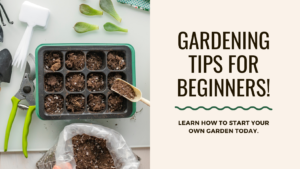
As a beginner gardener, knowing the basic gardening techniques is crucial to ensure the success of your garden. In this section, we will walk you through the essential steps of preparing your soil, proper watering techniques, fertilizing basics, and the importance of mulching for the health of your plants.
Preparing Soil
Before you start planting, it’s important to prepare your soil properly. Good soil preparation provides your plants with the necessary nutrients and creates a favorable environment for growth. Here are some steps to follow:
- Clear the area of any weeds or debris.
- Loosen the soil using a garden fork or tiller to improve drainage and aeration.
- Add organic matter such as compost or well-rotted manure to enrich the soil.
- Mix the organic matter into the soil thoroughly.
| Benefits of Soil Preparation | |
|---|---|
| 1 | Improved nutrient availability |
| 2 | Enhanced soil structure |
| 3 | Better water drainage |
| 4 | Increased root development |
Proper Watering Techniques
Watering your plants correctly is essential for their survival and growth. Here are some tips for proper watering:
- Water your plants deeply and infrequently to encourage deep root growth.
- Water early in the morning or late in the evening to reduce evaporation.
- Focus on the base of the plants, avoiding wetting the foliage excessively.
- Use a watering can or hose with a gentle spray nozzle to ensure even distribution.
Fertilizing Basics
Plants require nutrients for healthy growth, and fertilizing provides those essential nutrients. Here are some basics to keep in mind:
“Feed the soil, and the soil will feed your plants.”
Choose the right type of fertilizer for your plants, such as organic or slow-release fertilizers. Follow the instructions on the packaging for proper application and avoid over-fertilizing, as it can harm your plants.
The Importance of Mulching
Mulching is a simple yet effective technique that offers numerous benefits for your garden:
- Retains soil moisture, reducing the need for frequent watering.
- Suppresses weed growth, minimizing competition for nutrients.
- Regulates soil temperature, protecting plants from extreme heat or cold.
- Prevents soil erosion and compaction, maintaining soil structure.
Apply a layer of organic mulch, such as wood chips or straw, around your plants, ensuring not to pile it against the stems. This will help maintain a healthy and thriving garden.
Now that you have learned the basic gardening techniques, you are equipped with the knowledge to nurture your plants and create a flourishing garden. So roll up your sleeves, grab your gardening tools, and start implementing these techniques in your own backyard!
Troubleshooting Common Issues
As a beginner gardener, it’s common to encounter challenges along your green thumb journey. But don’t worry; we’re here to help! In this section, we’ll discuss some of the common issues you may face in your garden and provide guidance on how to troubleshoot them effectively.
Identifying Pests
Pests can wreak havoc on your plants and hinder their growth. It’s crucial to identify and address pest problems promptly. Here are a few common garden pests you may come across:
- Aphids
- Slugs and Snails
- Caterpillars
To identify pest infestations, carefully inspect your plants and look for signs such as holes in leaves, chewed stems, or sticky residue. Once identified, you can take appropriate measures to protect your garden.
Treating Diseases
Plants are susceptible to diseases that can weaken or even kill them. By familiarizing yourself with common plant diseases, you can take action early on and mitigate their impact. Here are a few examples of plant diseases:
- Fungal infections
- Bacterial infections
- Viral diseases
To treat plant diseases, it’s important to diagnose the specific issue affecting your plants. This will help you determine the appropriate treatment, which may include applying fungicides, removing infected plant parts, or adjusting environmental conditions.
Managing Watering Challenges
Proper watering is essential for plant health, but it’s not always easy to get it right. Here are two common watering challenges you may face:
Overwatering: Overly saturated soil can lead to root rot and other problems. To avoid overwatering, ensure that the soil is well-draining and water your plants only when the top inch of soil feels dry.
Under-watering: Insufficient water can cause plants to wilt and eventually die. Be mindful of your plant’s water requirements and provide adequate hydration, especially during hot and dry periods.
By managing watering challenges effectively, you’ll be able to strike the right balance and keep your plants healthy and thriving.
Troubleshooting Table
| Issue | Cause | Solution |
|---|---|---|
| Pest Infestation | Aphids, slugs, caterpillars | Use organic pest control methods, such as spraying with neem oil or introducing beneficial insects like ladybugs. |
| Plant Diseases | Fungal, bacterial, viral infections | Identify the specific disease and apply appropriate treatments, such as fungicides or removing infected parts. |
| Overwatering | Excessive watering | Check soil moisture before watering and ensure proper drainage. |
| Under-watering | Insufficient watering | Monitor plant’s water needs and provide adequate hydration. |
Remember, troubleshooting common issues is part of the learning process. With experience and knowledge, you’ll become more adept at addressing challenges and maintaining a healthy garden.
Celebrating Your Progress as a Beginner Gardener
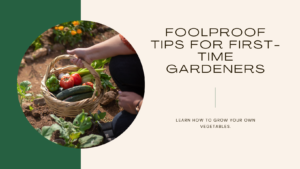
Gardening is a journey of growth and enjoyment, and as a beginner gardener, it’s important to celebrate your progress along the way. Each step you take towards creating and nurturing your garden is an achievement worth celebrating. Whether it’s successfully growing your first seedling or harvesting your first crop, take a moment to acknowledge and appreciate the progress you’ve made.
Learning and experimenting are key elements of becoming a skilled gardener. Don’t be afraid to try new techniques, explore different plant varieties, and learn from both successes and failures. By embracing a mindset of continuous learning and experimentation, you’ll expand your gardening knowledge and skills, ultimately becoming a more confident and successful gardener.
“The more you experiment, the more you learn. And the more you learn, the closer you are to unlocking the secrets of a lush and thriving garden.”
Remember, every gardener’s journey is unique, and progress should be celebrated at every stage. Whether it’s mastering a new pruning technique or cultivating a breathtaking flower bed, each accomplishment represents your dedication and commitment to your garden.
“Success is not just about the end result, but about the growth and fulfillment you experience along the way.”
So take a moment to pause and celebrate your progress, no matter how small or large. Share your achievements with fellow gardeners, family, and friends, and bask in the joy of what you’ve accomplished. After all, this journey is not just about the destination; it’s about the process of discovering and nurturing your own green thumb.
Importance of Starting from Scratch
When it comes to gardening, starting from scratch is not only beneficial but also incredibly rewarding. Building a garden from the ground up allows you to learn valuable skills, embrace the process of growth, and witness the transformation of your space into a lush and thriving oasis.
Starting from scratch provides you with an opportunity to create a garden that truly reflects your vision and personal style. By carefully selecting the plants, layout, and design elements, you can craft a unique outdoor space that is a true reflection of your personality and taste.
One of the key benefits of starting from scratch is the learning experience it offers. As a beginner, you will gain hands-on knowledge about soil preparation, plant care, and the intricate details of gardening. This practical learning process will not only help you develop a green thumb but also instill a deep sense of confidence and accomplishment.
Another advantage of starting from scratch is the joy of seeing your garden gradually take shape over time. From planting tiny seeds to nurturing young seedlings and witnessing them grow into robust plants, each step of the journey will fill you with a sense of fulfillment and wonder. This gradual progression allows you to appreciate the beauty of nature and the incredible power of your own efforts.
“Gardening is a process that teaches patience, resilience, and the importance of nurturing. Starting from scratch gives you the chance to experience the magic of growth firsthand.”
Moreover, starting from scratch enables you to create a garden that aligns with your sustainability goals and environmental values. You can implement eco-friendly practices right from the beginning, such as composting, water conservation, and planting native species. By doing so, you contribute to the health of the planet and create a harmonious ecosystem within your own backyard.
The Benefits of Starting from Scratch:
- Opportunity to learn valuable gardening skills
- Creation of a unique and personalized garden
- Sense of accomplishment and self-confidence
- Joy of witnessing the gradual growth and transformation
- Alignment with sustainability and environmental goals
Embrace the journey of starting from scratch and discover the wonders of gardening. With patience, passion, and a willingness to learn, your garden will flourish, and you will become a skilled and experienced gardener.
| Benefits of Starting from Scratch | Explanation |
|---|---|
| Opportunity to learn valuable gardening skills | Starting from scratch allows beginners to gain hands-on knowledge and develop essential gardening skills. |
| Creation of a unique and personalized garden | Building a garden from scratch enables you to design a space that reflects your vision and personal style. |
| Sense of accomplishment and self-confidence | Witnessing the growth and progress of your garden instills a sense of achievement and boosts self-confidence. |
| Joy of witnessing the gradual growth and transformation | Starting from scratch allows you to observe and appreciate the journey of your garden as it evolves over time. |
| Alignment with sustainability and environmental goals | You can incorporate eco-friendly practices right from the start and create an environmentally conscious garden. |
Embark on your gardening adventure, starting from scratch, and cultivate a space filled with beauty, vitality, and your personal touch. Enjoy the process, embrace the challenges, and prepare to be amazed by the wonders of nature.
FAQ
Q. Why is gardening a great hobby for beginners?
A. Gardening is a great hobby for beginners because it is accessible, therapeutic, and rewarding. It allows you to connect with nature, learn new skills, and enjoy the fruits of your labor.
Q. What are the benefits of starting a garden from scratch?
A. Starting a garden from scratch allows you to have full control over the design, plant selection, and overall aesthetic. It also provides a valuable learning experience and a sense of accomplishment as you witness the transformation of an empty space into a vibrant garden.
Q. How do I choose the right location for my garden?
A. To choose the right location for your garden, assess your available space and sunlight. Look for areas with at least 6 hours of direct sunlight per day and ensure there is enough space for your plants to thrive without being overcrowded.
Q. What are some tips for selecting the best spot for my garden?
A. When selecting the best spot for your garden, consider factors such as soil quality, drainage, and proximity to a water source. Additionally, observe the area throughout the day to determine how much shade it receives, as some plants may require partial shade.
Q. What are the essential gardening tools that beginners should have?
A. Some essential gardening tools that beginners should have include a trowel, hand pruners, a garden fork, a watering can or hose, and a rake. These tools will help you with planting, pruning, cultivating the soil, watering, and maintaining your garden.
Q. How can I acquire and maintain my gardening tools?
A. To acquire your gardening tools, visit your local garden center or shop online. Look for quality tools that are comfortable to use and durable. To maintain your tools, clean them after each use, sharpen blades regularly, and store them in a dry and secure place to prevent rusting.
Q. How do I select the right plants for my garden?
A. When selecting plants for your garden, consider your location’s plant hardiness zone, which indicates the suitability of different plants for your climate. Additionally, choose beginner-friendly plants that are easy to grow and maintain, such as herbs, tomatoes, and lettuce.
Q. What are some basic gardening techniques that beginners need to know?
A. Beginners should learn basic gardening techniques such as preparing the soil by removing weeds and adding compost, watering plants adequately, fertilizing plants with appropriate nutrients, and mulching to retain moisture and suppress weed growth.
Q. What are some common issues that beginners may encounter in their gardens?
A. Beginners may encounter common issues such as pest infestations, plant diseases, overwatering, under-watering, and soil nutrient deficiencies. These issues can be addressed through proper identification, treatment, and implementing preventive measures.
Q. How can I celebrate my progress as a beginner gardener?
A. Celebrate your progress as a beginner gardener by taking pride in the growth of your plants and the beauty they bring to your garden. Share your achievements with friends and family, and take photos to mark the milestones of your gardening journey.
Conclusion
Congratulations on reaching the end of our foolproof gardening tips for absolute beginners! We hope this article has provided you with valuable insights and guidance for starting your own garden journey. Remember, gardening is a wonderful hobby that offers numerous benefits for both the mind and body.
By following our garden tips, you can embark on your green thumb journey with confidence. Start by choosing the right location for your garden, considering factors like available space and sunlight. Acquire the essential gardening tools and select the right plants based on your climate and soil conditions.
Mastering basic gardening techniques such as preparing the soil, watering correctly, fertilizing appropriately, and mulching can ensure healthy plant growth. Additionally, being aware of common issues and how to troubleshoot them will help you overcome challenges along the way.
Remember, gardening is a continuous learning process, and every step you take contributes to your progress. Celebrate your achievements, no matter how small, as you create a garden that reflects your passion and dedication. We believe in you and wish you a successful and fulfilling journey ahead!


